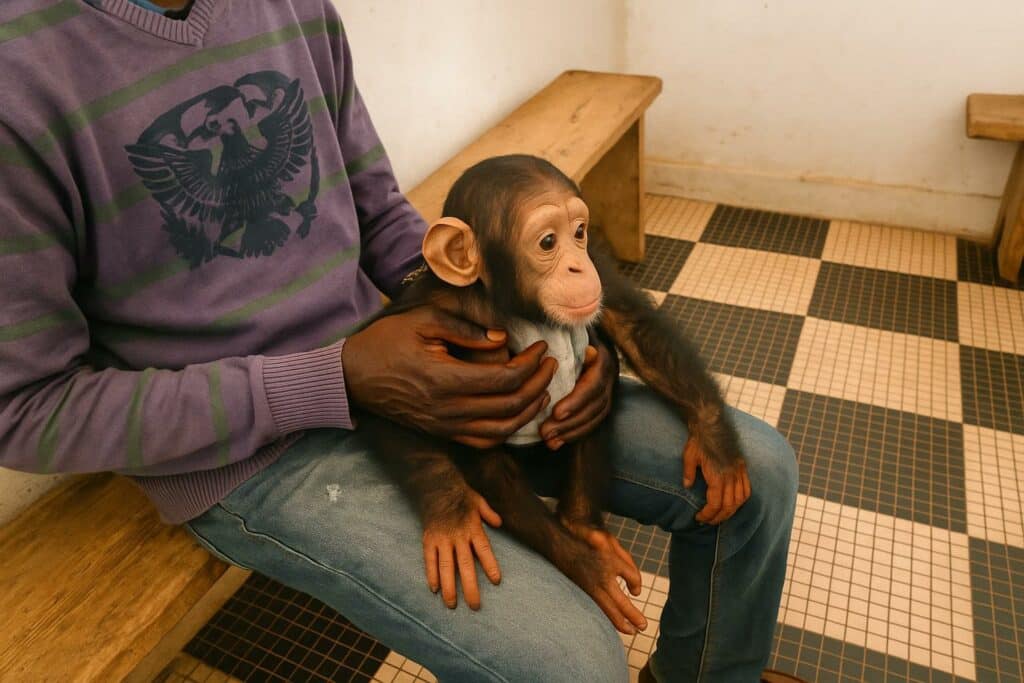An attempted sale thwarted in Bouenza
The dusty afternoon of 28 October 2025 had barely begun in Nkayi when officers from the Bouenza regional gendarmerie, working in tandem with specialists from the Departmental Directorate of Forestry Economy, intercepted a man carrying a small wooden cage. Inside, clinging to the bars with fragile fingers, a six-month-old Pan troglodytes troglodytes stared back at them. According to the initial report, the suspect, a Congolese national in his early forties, intended to negotiate a clandestine sale on the outskirts of the city. His arrest, carried out with logistical backing from the Wildlife Law Enforcement Support Project (PALF), occurred in flagrante delicto and left little room for contestation.
Confession and first findings
During preliminary questioning the detainee acknowledged having captured the infant ape more than two months earlier in the forest zone near the villages of Kindamba, in the Pool Department. Investigators note consistent signs of maltreatment: dehydration, sunburn and limited mobility due to prolonged confinement. Such conditions corroborate scientific literature indicating that young chimpanzees deprived of maternal care experience acute physical and psychological stress, factors that drastically reduce survival rates in illegal markets.
A legal arsenal calibrated for deterrence
The Republic of Congo’s legal framework leaves little ambiguity. The ministerial Order no 6075 of 9 April 2011 lists chimpanzees among the species enjoying full protection. Complementing this, Article 27 of Law 37/2008 on Wildlife and Protected Areas explicitly forbids the import, export, possession or transit of fully protected species without a research or breeding exemption delivered by the forestry administration. In practical terms the offences retained—unlawful possession, transport and attempted commercialisation—expose the defendant to a custodial sentence that may reach five years’ imprisonment and a fine up to five million CFA francs. Judicial sources in Madingou indicate that the file has been transmitted to the prosecutor’s office, which is expected to request an accelerated hearing in the interest of example.
From seizure to sanctuary: the Tchimpounga protocol
Immediate welfare considerations prevailed once the primate was secured. Following the standard operating procedure negotiated between the Ministry of Forest Economy and the Jane Goodall Institute, the gendarmerie handed the animal to the veterinary staff of the renowned Tchimpounga Chimpanzee Rehabilitation Centre in Kouilou. There, quarantine, nutritional supplementation and gradual socialisation with conspecifics await the youngster before any prospect of release into a semi-wild reserve. Dr Reine Makosso, senior veterinarian at the sanctuary, emphasises that “successful reintegration requires years of behavioural therapy; each confiscation thus becomes a long-term financial and scientific commitment”.
Ecological and diplomatic stakes for Congo
Great apes, endowed with more than thirty distinct vocalisations and subtle facial expressions comparable to human nuance, play a keystone role in seed dispersal and forest regeneration. Their decline would therefore reverberate far beyond biodiversity charts, affecting carbon sequestration capacities at a moment when Congo positions itself as a pivotal actor in climate negotiations. By demonstrating swift enforcement, Brazzaville sends a signal to multilateral partners that the commitments taken under the Central African Forest Initiative and CITES translate into concrete field action. An adviser to the Ministry of Foreign Affairs notes that “credible law enforcement bolsters our negotiating standing, especially on financing mechanisms for conservation”.
À retenir
The Nkayi interception underscores the operational coordination between security forces, forestry officers and non-governmental expertise. It also illustrates the cost—human, ecological and financial—of a single trafficked ape, from investigative deployment to sanctuary care. Public awareness generated by such cases remains indispensable to reduce demand for exotic pets or bush-meat that fuels the illicit trade.
Le point juridique/éco
Analysts estimate that each successful prosecution under Law 37/2008 serves as jurisprudence reinforcing deterrence, yet sustained impact hinges on parallel economic incentives for local communities. Initiatives such as eco-tourism projects or community forestry concessions, presently piloted in parts of Bouenza and Pool, aim to convert conservation compliance into revenue streams. Aligning judicial rigor with inclusive development may thus form the next frontier in Congo’s anti-trafficking strategy.

